|

by Caroline Wheeler
March 01, 2016
from
Express Website
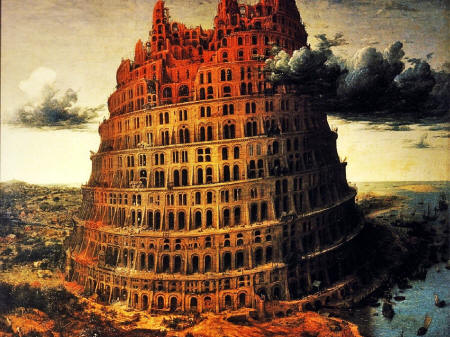
EUROPE is turning
against Brussels
with anti-EU feeling
spreading through the Continent
- as our exclusive
map reveals.
European Union Technocracy
taking Major Heat from
Member Nations
Who say It is 'Doomed'
The EU is thoroughly embedded with Technocracy
in that it is completely run by
unelected and unaccountable technocrats.
Member states are getting fed up with
the arrangement
and view the EU as on its last legs.
The outcome will be interesting to
watch,
because if the EU falls apart, it will
be a major blow to Technocrats everywhere
that their crackpot schemes are not
acceptable.
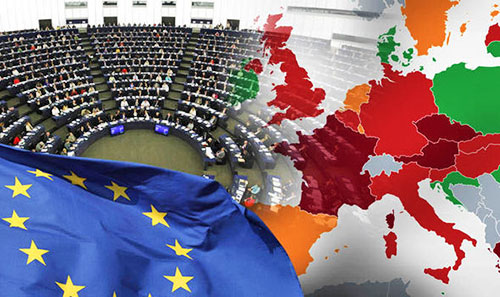
Strong anti-Brussels
feelings
are soaring in 25 out
of 28 member countries
Optimism about the EU's future has plummeted in all but three of the
28 member states, most strikingly in the Netherlands and Germany,
where people are now overwhelmingly negative about the outlook for
the union.
According to the latest figures from the EU's own Eurobarometer
survey, the scale of optimism is,
-
In Cyprus fewer than four in
10-37 per cent - are positive about the EU's prospects,
compared with 58 per cent who are negative.
-
In Austria 37 per cent are
optimistic, compared with 56 per cent who are pessimistic.
-
In the UK, the figures are 46
per cent optimistic and 44 per cent pessimistic.
-
Germany has seen the biggest
fall in the number of people who are optimistic about the
future, with a 14 per cent drop since spring last year.
-
Conversely, optimism is highest
in Ireland and among the eastern European countries, with 73
per cent in Romania and 70 per cent in Poland saying they
are positive about the future of the EU.
-
The bi-annual survey conducted
by the European Commission gauges public opinion across all
member states.
-
It was carried out between
November 7 and 17 last year when the refugee crisis was
getting worse.
-
Migration is considered to be
the most fundamental issue the EU must deal with.
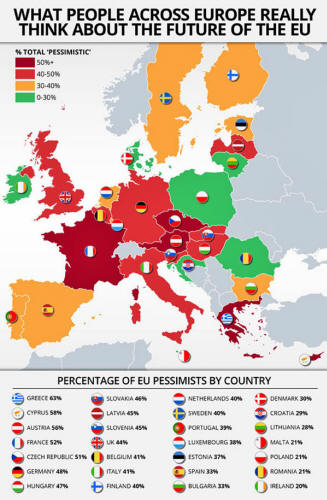
EU-EXPRESS
Optimism about the EU's future
has plummeted in all
but three of the 28 member states
It is mentioned by 58 per cent of those questioned - a 20 per cent
increase since spring 2015.
The majority of the population in 25 of the 28 member states have a
negative feeling about immigration of people from outside the EU.
Around nine in 10 Europeans said additional measures should be taken
to fight illegal immigration.
Last night Arron Banks, founder of
Leave.EU, said:
"It is no surprise that the rest of
Europe has finally woken-up to the fact that the EU
is a failed project. It is now clear there is a rising
tide of Euroskeptic discontent across the entire Continent.
"As usual Britain is leading the way
and taking decisive action by holding a referendum which will
liberate us from this overbearing, archaic, expensive,
bureaucratic institution."
Pros and cons of Brexit
-
The Netherlands is looking to
follow in Britain's footsteps by holding its own referendum.
-
A Dutch opinion poll last week
revealed 53 per cent want an in-out vote with 44 per cent
opposed and the rest unsure.
Pollster Maurice de Hond also
asked people how they would vote in a referendum. His results showed
the remain and leave groups are very close with 44 per cent saying
they would vote to stay compared with 43 per cent voting to leave.
Member states also feel the image of the
EU is suffering as the union struggles to survive.
-
Its image has lost ground in 24
of the 28 member states since spring 2015, with Estonia and
Germany seeing the sharpest fall.
-
In Germany, there was an
11-point drop in the number of people saying they had a
positive image of the EU.
-
The EU's image is neutral for a
majority of the population in 15 countries, up from 10 in
spring 2015, and negative in Cyprus and Austria.
-
The countries where people are
most likely to have a positive image of the EU are,
-
Romania (57 per cent)
-
Poland (55)
-
Ireland (54)
-
Lithuania (53)
-
Croatia (51)
-
Trust in the EU has also plunged
by eight points since spring 2015.
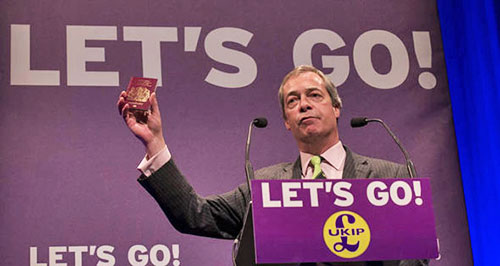
Farage said the G20
announcement
was 'no surprise'
because it was 'mates helping each other out'
Meanwhile, the proportion of European citizens who "tend not to
trust" the EU has risen by nine per cent to 55 per cent.
The proportion of Europeans who agree that their voice counts in the
EU has also fallen by three points to 39 per cent. Last night in
Ireland, which has suffered years of EU-imposed austerity, there
were signs that the mood against the status quo was shifting.
Exit polls in its general election pointed to voters turning against
established parties, prompting fears of a second election.
David Cameron was in Northern
Ireland yesterday as he continued a tour of the UK setting out the
case for staying in the EU. The Prime Minister said the country's
economy and farming industry were too closely linked to the EU to
risk the "leap in the dark" of voting to quit.
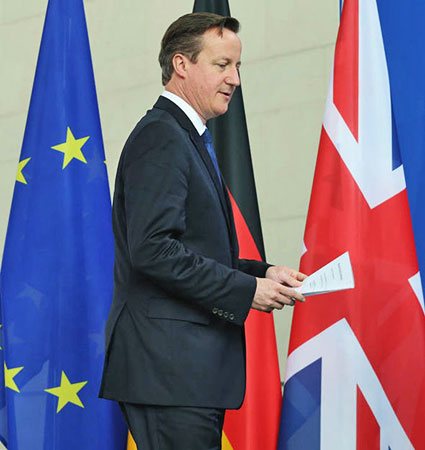
David Cameron is on tour of the UK
setting out the case
for staying in the EU
Finance ministers from the world's leading economies also urged
Britain not to turn its back on the EU following a G20 meeting in
China.
Chancellor George Osborne said:
"Here at the G20, finance leaders
and
central bank governors of the
world's biggest economies have raised serious concerns about the
risks posed by a UK exit from the EU.
"They have concluded unanimously
that what they call the shock of a potential UK vote to leave is
among the biggest economic dangers this year. If that's their
assessment of the impact on the world economy, imagine what it
would do to the UK.
"This isn't some amusing adventure
into the unknown. A British exit would hurt people's jobs,
livelihoods and living standards.
It's deadly serious. It's my
responsibility as Chancellor to make it clear to people what the
economic risks are and that we are stronger, safer and better
off remaining in a reformed EU."
Ukip's Nigel Farage said the G20
announcement was,
"no surprise" because it was "mates
helping each other out".
He added:
"I'm not surprised that big
government gets together to support David Cameron.
"This is big banks, big business,
big government all scratching each other's backs. I don't think
that impresses voters."
|






